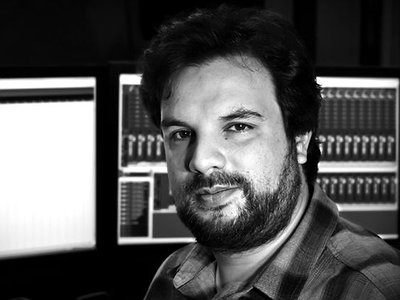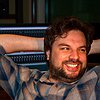Name: David Buckley
Nationality: British
Occupation: Film composer
Bands/Projects: The Good Wife, The Town, Parker, The Forbidden Kingdom, Blood Creek, From Paris with Love, Metal Gear Solid 4, Call of Duty: Ghosts, Batman: Arkham Knight
Labels: CBS Studios, West One Music, Activision, Varese Sarabande, Lionsgate Records, Silva Screen Records, Signum UK, Columbia Europe, Lakeshore Records
Musical Recomendations:Gabriel Yared/T Bone Burnett
When did you start composing film music - and what or who were your early passions and influences?
I did not work on my first film score until I moved to LA, aged 30. Prior to that I had worked on TV shows and commercials back in London, and I had written concert and choral music since the age of 9. My musical passions are fairly wide, but because of my cathedral music upbringing, I have a particular fondness for early English choral music.
What do you personally consider to be incisive moments in your work and/or career?
When I was 10, as part of the Wells Cathedral Choir, I sang on the soundtrack to The Last Temptation of Christ, with music by Peter Gabriel. At this point I realized there was this incredible synthesis of music and image. I am sure that lived with me for over a decade until I realized that I wanted to do something in this field for a living.
What are currently your main compositional challenges?
Trying to be original and different. There is so much music out there that it’s hard to come up with something unique. This is especially so when you have producers or directors who may be infatuated with a specific sound. Some projects lend themselves better than others at being able to take a more original tone. Finding an original voice is one of the hardest things to do in this business.
As a soundtrack composer, one must usually adapt one's ideas to the film, the director and the audience. How do you maintain a balance between, on the one hand, artistic integrity and sticking to your creative convictions and, on the other, being professional in your job? How do you find a sense of freedom within these structures?
The balance varies between projects. I’ve been on some gigs where the lead creative person has told me just to run off with my ideas and see where things end up. I’ve been on other projects where if I did not get close enough to the temp I would be fired. Normally I find myself somewhere between those two extremes. But yes, the job is to keep all those people happy, including yourself, but the needs of the movie have to come first.
What do you usually start with when composing? At which stage of the movie production process do you prefer to get involved?
I like to get on as early as possible, but this seldom happens in reality. I hear of composers who come on very early, go to the set while they are filming and give early drafts of ideas for the editors to cut to, and I am quite jealous of those guys. Normally I will have about a couple of months to score a film, in which time I need to write, arrange, produce, orchestrate, record, and mix the score.
What do improvisation and composition mean to you and what, to you, are their respective merits?
Composition is what I do when I have to start committing to my ideas; before that it is improvisation. I am not a particularly accomplished pianist, but I like to start any project (unless it is totally electronic) at the piano, coming up with something – a theme, a chord progression, a texture, etc. Then the composition process starts and I have to take what are essentially gestures and small fragments and build them into something bigger. The improvisation part feels like fun, and the composing part feels like work!
Over the decades, film music as a whole, despite the radical differences of genre or style, has developed certain traditions, techniques and thematic development. How would you describe your relationship with these traditions and what role does it play in your work?
I used to teach composition, and I would always tell my students that it is a good thing to learn the rules, and then by all means break all of them. So in my work, I am aware of the traditions in film scoring and draw on them when needed, but I have also worked on scores where it’s been vital to ignore all that stuff.



